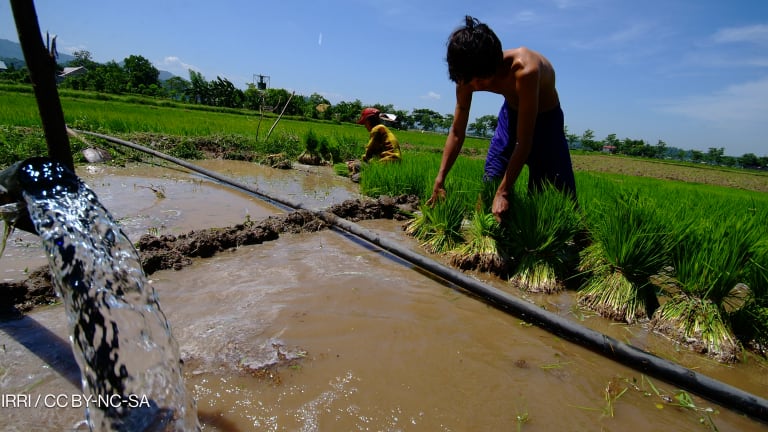
Water is often held up as a precious, life-giving element for its essential role in sustaining plants, people, and animals. But the world’s most important natural resource is also a tool, a force that can be harnessed for industry and energy, sanitation, food production, and consumption.
With the world facing a worsening hunger and nutrition and a climate crisis, it is no longer enough to focus on conserving water in one sector or location, only for it to be used for another sector or elsewhere.
The world must now shift toward maximizing the productivity of water across all of its uses — for food, livelihoods, and economies, and for ecological benefits — getting as much as possible from every last drop.
With food production currently responsible for 70% of global freshwater withdrawals and more than 90% in some agrarian economies, this shift towards greater water productivity should start with agriculture but can offer lessons for other sectors.
Increasing water productivity
To begin with, improvements in water productivity require more and better data on the state of existing resources and uses. By understanding the current supply, demand, and distribution of the resource, policymakers will be better informed to plan and manage water supplies, use water more efficiently, and reduce the risk of shortages and pollution.
To forestall further emergencies and prepare for the future, we must redefine how we understand water.
—At present, data on water is often scarce and unreliable, and declining funding for water projects will only exacerbate this. But with improved data from satellites and on the ground, for example, on expected rainfall, evaporation, or biomass, scientists can help predict weather patterns and environmental conditions that will allow farmers, industry, and governments to plan for and adapt to drier conditions.
Increasingly available data sets, water and climate atlas, and water risk analysis tools are providing information on climate and water availability, and associated risks. This data can help shape climate-resilient agricultural policies, such as improved irrigation, and promote drought-resistant food systems across farming, livestock, and aquaculture, while also helping policymakers to plan in water-stressed areas or places with low crop yields.
Furthermore, this supports water security in other sectors such as industries, energies, and cities, as well as the environment.
With more practical information, policy and decision-makers would also be able to determine sustainable limits on water use and ensure allocations across different water-using sectors are made efficiently.
Water productivity increases include “hard” measures, such as irrigation technology, agronomic practices, and industrial water efficiencies, and “soft” measures, such as economic incentives for crop choices, and insurance schemes to manage risks.
Besides reducing the impact of water scarcity, efforts to improve water productivity can also improve livelihoods and economic growth by diverting water to more productive uses according to need and opportunity.
In agriculture, maximizing water productivity might mean planting different crops that thrive with less water, or adopting a mixed crop and livestock production system.
But it might also mean diverting water to address health and sanitation issues that could ultimately allow families and communities to thrive, prosper, and reach their full potential. Diverting water to industries, while staying within sustainability limits, can boost growth and promote jobs and livelihoods.
By understanding where there is a critical need and then supporting water reallocation across sectors including agriculture, water productivity interventions can fulfill multiple objectives.
Greater water productivity in agriculture can also conserve water resources to support environmental sustainability, climate adaptation and mitigation, and poverty reduction to achieve the most for society. The benefits of improved water productivity can then be shared within and beyond the agricultural sector, and among some of the world’s most vulnerable communities.
For example, increasing the incomes of rural women through agricultural water management interventions can improve family welfare, as women are more likely to spend additional income on nutritious food for their children, education, or on health care.
Rarely are droughts and famines out of the news cycle as we increasingly face a dual challenge of food and water insecurity compounded by climate change and ecosystem degradation.
To forestall further emergencies and prepare for the future, we must redefine how we understand water: how much is available, where it is needed most, and how to deploy it sustainably to maximum effect.
This needs continued investment in water management research along with coordinated efforts at different scales — from farm to basin, to national and regional, and across public and private sectors.
Understanding the complexity of the issues and properly managing them will ensure we wring out as much value as possible within sustainable limits. This is a very knowledge-intensive endeavor that needs to be sufficiently resourced and capacitated.
Visit the WASH Works series for more coverage on water, sanitation, and hygiene — and importantly, how WASH efforts intersect with other development challenges. You can join the conversation using the hashtag #WASHWorks.









